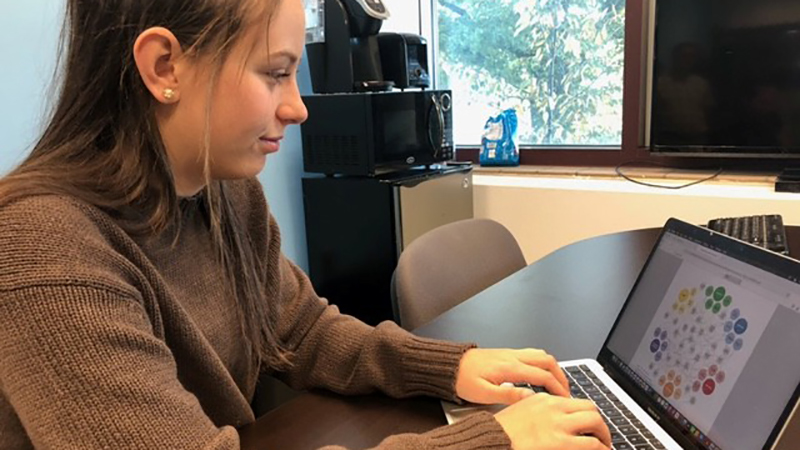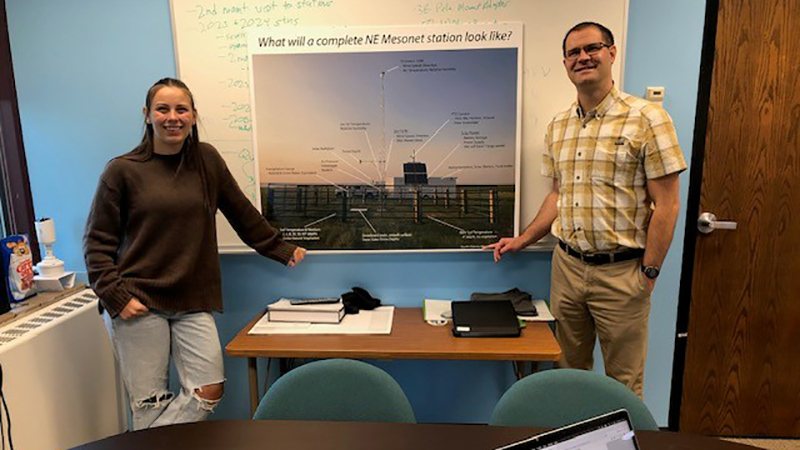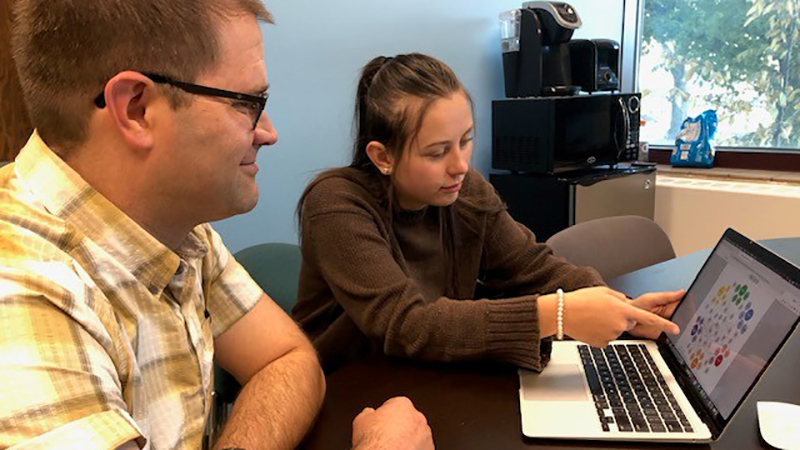Posted: 11/13/2025
Shifrin hones fisheries interest as climate intern

By Ronica Stromberg
Camille Shifrin, a fisheries and wildlife major, started work with the Nebraska State Climate Office in January 2024 to become more well-rounded. Almost two years in, the intern has reaped that benefit—and a first publication and a new research interest.
Now a senior in the School of Natural Resources at the University of Nebraska–Lincoln, Shifrin started the internship working on the state climate report, "Understanding and Assessing Climate Change: Preparing for Nebraska's Future." She wrote parts of its second and third chapters, proofread other parts, produced figures, collected and analyzed data and compiled references. Since the report’s release September 24, 2025, Shifrin has been producing videos to publicize it and cowriting monthly climate reports. She plans to finish the internship when she graduates in May.

Once she has earned her bachelor's degree, she would like to work for a fishery for a while, she said, and then continue her education to become a professor who teaches and does research. Her research interest? Spawning and reproduction in fish and the way winter temperatures affect that.
"I've always found spawning and reproduction in fish very interesting, because it's so different for every single species of fish," she said. "It's not like with mammals, where we all kind of reproduce the same. Fish, it entirely depends on what species you're looking at, and it's different for every single one of them."
Through her work at the climate office analyzing temperature trends, she said she has seen the United States overall, and particularly the Great Plains, growing warmer starting around 1980. September and November have warmed significantly and rapidly, she said, but February has cooled slightly.
"It was really interesting to see how even though, overall, the planet is warming, climate change doesn't really move in a straight line," she said. "There's a lot of complexity to it, and a lot of that warming trend and a lot of the way that our climate is changing does depend on the seasons and where you are in the country."
She said she expects to use her knowledge gained from work with the climate office and R programming language in advanced studies and her field. She gained skills also from work in the Aquatic Biodiversity and Conservation Lab at the University of Nebraska–Lincoln and as a tutor at the university's Military and Veteran Success Center. A former military brat with both parents in the Air Force, she considered flying jets but, eventually, chose her love of the outdoors and left Colorado to study fisheries and wildlife at Nebraska.

She took the Climate in Crisis class to meet general education requirements and met the instructor, Eric Hunt. He suggested she apply for the internship in the climate office. With the Climate in Crisis class being the only climate or meteorology class she had taken before the internship, the move from studies of fish and fisheries to climate science posed a learning curve.
"I came into it not knowing anything about climate science, and I was kind of thrust into the world of climate science," Shifrin said. "So, it was a lot of learning and a lot of self-study to catch up and make sure that I was where I needed to be to help with the assessment."
Hunt said he had met highly qualified meteorology students in the Climate in Crisis class but they were graduating and ineligible for the internship. Even though Shifrin was a fisheries student instead of a meteorology student, he said her ambition and attitude in class had impressed him.
"I hired Cam because of her work ethic and what I saw as potential for greatness," he said.

Shifrin didn't disappoint. She became a great asset to the team, Hunt said, especially with the work she did on the state climate report.
In May, he may be back to the Climate in Crisis class again for another candidate.
"Replacing Cam will be hard, but we likely will have opportunities for other ambitious undergraduate students in the School of Natural Resources," he said.
Shifrin has begun considering possible employers to work for starting in May and said she expects her well-rounded background to help in the job search. Already, when she applied for and received an internship with HDR last summer doing wetland delineations and threatened and endangered species reviews, she found coworkers enthusiastic about her skills.
"It was really interesting to hear them talk about how important it is in my field to be well-rounded, because I think a lot of people in my field tend to pick one thing, and then, like, that's their thing," she said. "There's nothing wrong with that at all—I'm kind of doing that a little bit with fisheries, actually—but it was really, really interesting to see how my perspective changed and how their perspective of me changed because I had put myself into some kind of uncomfortable situations to make myself more well-rounded."